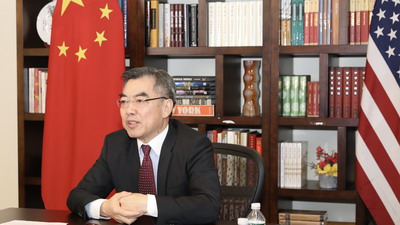
Dear friends,
Thank you all for joining our discussion and sharing your perspectives on China-U.S. relations. President Nixon’s trip to China and the Shanghai Communiqué issued 50 years ago are of trailblazing significance. It opened a new chapter in the bilateral relations and reshaped the international geopolitical map. Looking back, we must pay tribute to the elder generation of Chinese and American leaders for their extraordinary strategic foresight and high art of diplomacy.
The re-engagement between China and the U.S. 50 years ago was a rational decision based on our common interests. In the 1970s, China was in the chaotic period of the Cultural Revolution. Relations between China and the Soviet Union had become increasingly tense, and China remained largely isolated from the western countries. Across the Pacific, the U.S. was mired in the Vietnam war and its advantage over the Soviet Union in the Cold War was eroded. Waves of anti-war movements swept the whole country. China and the U.S. needed each other and the interactions between the two countries were natural. As President Nixon said during his visit, he had come for US interests. “It is not our common beliefs that have brought us together here, but our common interests and our common hopes.”
The re-engagement between China and the U.S. 50 years ago was the best example to show mutual respect. At that time, the differences between us were far greater than they are today. But the two sides showed respect for their differences, affirmed the common ground between the two countries and reached principled agreements on some major issues, creating a new style in international relations. The Shanghai Communiqué, issued during President Nixon’s visit, did not cover up the differences between the two sides, but truthfully listed the statements of both sides, especially on Taiwan question, the most important and sensitive issue in China-U.S. relations. The “Shanghai Communiqué” established that the two countries should abide by the “one China” principle, which provided the basis for the normalization of China-U.S. relations. After that, The Joint Communiqué on the Establishment of Diplomatic Relations and the August 17 Communiqué both followed this principle. For the past 50 years, the “one China” principle has always been the political foundation of China-U.S. relations. It’s also the key to maintain peace and stability across the Taiwan Strait.
The re-engagement between China and the U.S. 50 years ago has brought great benefits to the people of both countries and the world at large. With the development of China-U.S. relations, exchanges and cooperation between the two countries in various fields have developed steadily in the past decades. The bilateral trade volume has risen from almost zero to more than 750 billion US dollars per year, and personnel exchanges have increased from few to more than 5 million people per year. From a global perspective, the past half century of peace and stability in the world, particularly the sustained development of the Asia-Pacific region, can also be attributed to the China-U.S. interactions since 1972.
Fifty years later, China-U.S. relations have once again reached a crossroad, and where it will go has attracted much attention. As President Xi Jinping said during the virtual meeting with President Biden, the most important event in international relations over the past 50 years was the reopening and development of China-U.S. relations. The most important event in international relations in the coming 50 years will be for China and the U.S. to find the right way to get along. History is a mirror of the past and the best teacher for the present. At this critical moment, it is necessary for us to learn from history and guide the future. The most important wealth left to us from the 1972 re-engagement is that China and the U.S. must always focus on the common interests of the two countries, put aside disputes and differences with a flexible and pragmatic attitude, and deal with their relations in the principle of mutual respect, peaceful coexistence and win-win cooperation.
The Beijing Winter Olympics have just concluded. Just like athletes, China and the U.S. have a competitive relationship, but human nature and friendship are higher than the competitive relationship. The friendship between the Chinese and American people has always been the source of the development of China-U.S. relations. I hope all of our friends from both countries could continue to build bridges for our exchanges and cooperation, and contribute to China-U.S. relations tiding the waters and sailing ahead steadily in the ocean of history.
